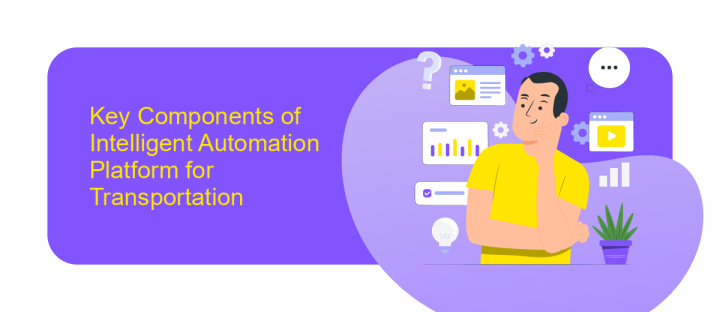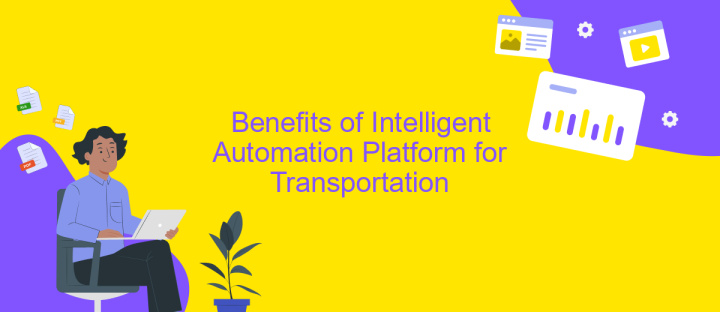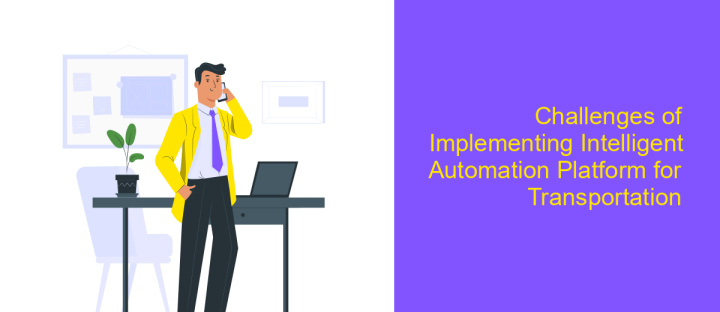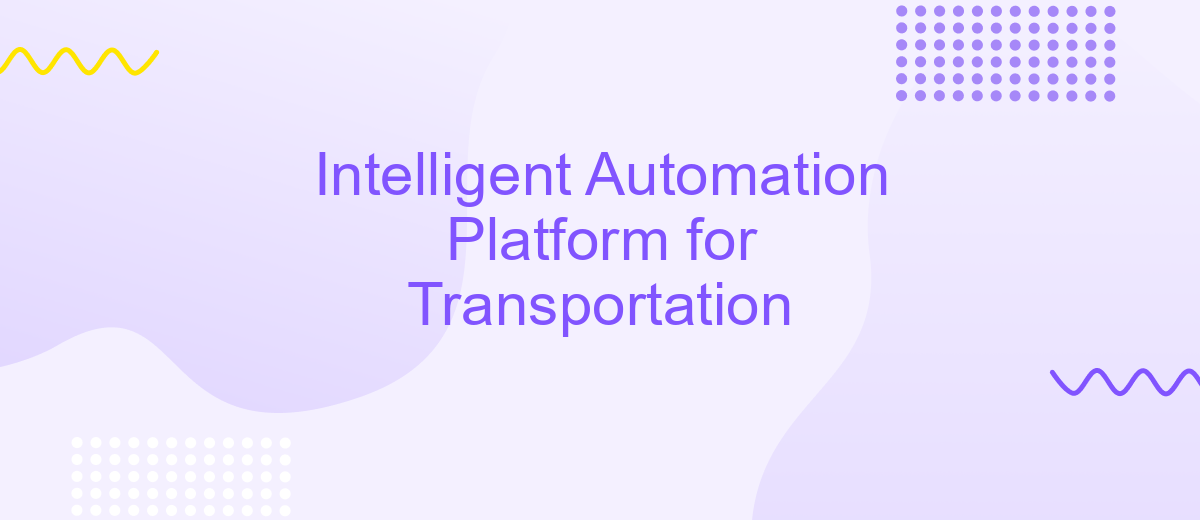Intelligent Automation Platform for Transportation
In today's rapidly evolving transportation landscape, the integration of intelligent automation platforms is revolutionizing the industry. These advanced systems streamline operations, enhance safety, and improve efficiency by leveraging cutting-edge technologies such as artificial intelligence, machine learning, and the Internet of Things. As transportation networks become increasingly complex, intelligent automation offers a transformative solution, enabling seamless connectivity and real-time decision-making to meet the demands of modern mobility.
Introduction to Intelligent Automation Platform for Transportation
The transportation industry is undergoing a transformative shift with the integration of intelligent automation platforms. These advanced systems leverage cutting-edge technologies such as artificial intelligence, machine learning, and the Internet of Things to streamline operations, enhance efficiency, and reduce costs. By automating complex processes and enabling real-time data analysis, transportation companies can optimize their operations and improve customer experiences.
- Enhanced operational efficiency through automated scheduling and route optimization.
- Improved safety with predictive maintenance and real-time monitoring.
- Cost reduction by minimizing fuel consumption and operational downtime.
- Increased customer satisfaction through timely and reliable service delivery.
As the demand for smarter and more efficient transportation solutions grows, the adoption of intelligent automation platforms becomes increasingly vital. These systems not only address current logistical challenges but also pave the way for a more sustainable and resilient transportation infrastructure. By embracing these innovations, the industry is poised to meet the evolving needs of a connected world, ensuring seamless mobility and enhanced service delivery for all stakeholders involved.
Key Components of Intelligent Automation Platform for Transportation

Intelligent automation platforms for transportation are built upon several key components that work synergistically to optimize operations. At the core is data integration, where diverse data sources like GPS, traffic systems, and weather forecasts are seamlessly connected. This is facilitated by integration services such as ApiX-Drive, which streamline the process of linking various applications and systems, ensuring real-time data flow and enhancing decision-making capabilities. Additionally, machine learning algorithms play a crucial role by analyzing patterns and predicting outcomes to optimize routes and schedules, thereby reducing fuel consumption and improving efficiency.
Another essential component is process automation, which involves the use of robotic process automation (RPA) to handle repetitive tasks, such as scheduling and dispatching, minimizing human error and freeing up resources for more strategic activities. Furthermore, the platform incorporates advanced analytics tools that provide insights into operational performance, enabling continuous improvement. Together, these components form a comprehensive solution that enhances the agility and responsiveness of transportation systems, ultimately leading to improved service delivery and customer satisfaction.
Benefits of Intelligent Automation Platform for Transportation

Intelligent automation platforms are revolutionizing the transportation industry by streamlining operations and enhancing efficiency. These platforms integrate advanced technologies such as AI, machine learning, and IoT to automate complex processes, leading to significant improvements in service delivery and cost reduction. By leveraging intelligent automation, transportation companies can optimize routes, reduce fuel consumption, and improve safety, ultimately providing a better experience for customers.
- Increased Efficiency: Automation reduces manual intervention, speeding up processes and minimizing errors.
- Cost Savings: By optimizing resource allocation and reducing fuel usage, companies can achieve substantial cost reductions.
- Enhanced Safety: Automated systems monitor and predict potential hazards, improving overall safety for passengers and goods.
- Improved Customer Experience: Faster and more reliable services lead to higher customer satisfaction and loyalty.
- Data-Driven Insights: Automation platforms provide valuable analytics that help in strategic decision-making and continuous improvement.
In conclusion, the adoption of intelligent automation platforms in transportation is a game-changer, offering numerous benefits that enhance operational performance and customer satisfaction. As the industry continues to evolve, these platforms will play a crucial role in shaping the future of transportation, making it more efficient, safe, and customer-centric.
Challenges of Implementing Intelligent Automation Platform for Transportation

Implementing an Intelligent Automation Platform in the transportation sector presents several challenges. One of the primary hurdles is the integration with existing legacy systems. Many transportation companies rely on outdated technology, making it difficult to seamlessly incorporate new automation solutions without significant disruptions.
Another challenge is ensuring data security and privacy. As transportation systems become more connected, the risk of cyber threats increases. Protecting sensitive data from breaches and ensuring compliance with regulations is crucial for maintaining trust and reliability.
- High initial investment costs for technology and infrastructure.
- Resistance to change from employees accustomed to traditional methods.
- Complexity in managing and analyzing large volumes of data.
- Ensuring interoperability between different systems and devices.
Moreover, there is the issue of regulatory compliance. Transportation companies must navigate a complex web of local, national, and international regulations, which can vary significantly. Successfully implementing an intelligent automation platform requires careful planning, collaboration with stakeholders, and a clear understanding of the regulatory landscape to avoid potential legal pitfalls.


Conclusion and Future Outlook
The Intelligent Automation Platform for Transportation has demonstrated significant potential in optimizing logistics, enhancing operational efficiency, and reducing costs. By leveraging advanced technologies like AI and machine learning, transportation systems can become more adaptive and responsive to real-time challenges. The integration of platforms such as ApiX-Drive facilitates seamless data exchange and process automation across various systems, ensuring that transportation networks remain efficient and scalable.
Looking ahead, the future of intelligent automation in transportation is promising, with innovations expected to drive further advancements in autonomous vehicles and smart infrastructure. Continued development in these areas will likely lead to safer, more reliable, and environmentally sustainable transportation solutions. As the industry evolves, fostering collaboration between technology providers, policymakers, and stakeholders will be crucial to unlocking the full potential of intelligent automation. Embracing these changes will not only enhance transportation systems but also contribute to broader societal benefits, such as reduced traffic congestion and lower carbon emissions.
FAQ
What is an Intelligent Automation Platform for Transportation?
How can Intelligent Automation benefit the transportation industry?
What types of tasks can be automated in transportation using an Intelligent Automation Platform?
How does integration work with existing transportation systems?
Is it necessary to have technical expertise to implement an Intelligent Automation Platform?
Time is the most valuable resource in today's business realities. By eliminating the routine from work processes, you will get more opportunities to implement the most daring plans and ideas. Choose – you can continue to waste time, money and nerves on inefficient solutions, or you can use ApiX-Drive, automating work processes and achieving results with minimal investment of money, effort and human resources.

